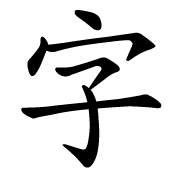Azana
| Courtesy name (Zi) | |
 |
|
| Chinese name | |
|---|---|
| Simplified Chinese | (表) 字 |
| Hanyu Pinyin | (biǎo) zì |
| Wade–Giles | (piao)-tzu |
| Vietnamese name | |
| Vietnamese | tên chữ (tự) |
| Korean name | |
| Hangul | 자 |
| Hanja | 字 |
| Revised Romanization | ja |
| McCune–Reischauer | cha |
| Japanese name | |
| Kanji | 字 |
| Hiragana | あざな |
| Revised Hepburn | azana |
A courtesy name (Chinese: 字, zi), also known as a style name, is a name bestowed upon one at adulthood in addition to one's given name. This practice is a tradition in East Asian cultures, including China, Japan, Korea, and Vietnam.
Formerly in China, the zi would replace a male's given name when he turned twenty, as a symbol of adulthood and respect. It could be given either by the parents or by the first personal teacher on the first day of family school.
Females might substitute their given name for a zi upon marriage.
One also may adopt a self-chosen courtesy name.
In China the popularity of the custom has declined to some extent since the May Fourth Movement in 1919.
A courtesy name is not to be confused with an art name (hào, Chinese: 號, Korean: 호), another frequently mentioned term for an alternative name in Asian culture-based context. An art name is usually associated with art and is more of a literary name or a pseudonym that is more spontaneous, compared to a courtesy name.
The zì, sometimes called the biǎozì or "courtesy name", is a name traditionally given to Chinese males at the age of 20, marking their coming of age. It was sometimes given to females upon marriage. The practice is no longer common in modern Chinese society. According to the Book of Rites, after a man reaches adulthood, it is disrespectful for others of the same generation to address him by his given name, or míng. Thus, the given name was reserved for oneself and one's elders, while the zì would be used by adults of the same generation to refer to one another on formal occasions or in writing; hence the term "courtesy name".
The zì is mostly disyllabic (consists of two Chinese characters) and is usually based on the meaning of the míng or given name. Yan Zhitui of the Northern Qi dynasty believed that while the purpose of the míng was to distinguish one person from another, he asserted that the zì should express the bearer's moral integrity.
...
Wikipedia
